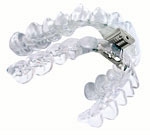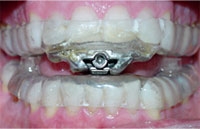Sleep Apnea & Snoring Treatment
The cycle of OSA
Obstructive sleep apnea (OSA) occurs when the airway completely collapses blocking
airflow into the lungs. The harder one tries to breathe, the tighter the airway seals.
This airway obstruction persists until the brain partially awakens the person. Unconsciously,
he/she will close the jaw returning the tongue and throat to a normal position.
The cycle of falling asleep-jaw relaxing, airway collapsing, unconsciously awakening with a
gasp, falling back asleep-can repeat itself up to one time per minute or more in severe cases.
With a blocked airway, one does not receive enough oxygen and this can trigger both minor and
serious health problems.
Sleep disorder breathing
Research shows that 74% of American adults experience sleeping problems a few nights a week
or more; and more than one in three (37%) are so sleepy during the day that their sleepiness
interferes with their activities.
Sleeping problems may affect:
- your productivity and performance at work
- increase your risk of injury or illness
- cause strain in personal relationships
- be a sign of a more serious problem called obstructive sleep apnea.
One of the leading reasons and highest contributing factors to poor sleep is sleep disorder breathing,
which includes snoring and sleep apnea. One third of the older adult population snores, and snoring is
four times more common in men than women. The quality of your sleep affects your daily activities and
has a huge impact on the overall quality of your life. If you are not getting enough quality sleep
during the night then you and your body may suffer.
A simple yet effective treatment
Loud snoring can destroy
relationships. The good news is
these problems can be treated with a
simple oral appliance. Dr. Cyriac
offers the redesigned TAP®
(Thornton Adjustable Positioner)
appliance as treatment
for sleep apnea and snoring. The
design changes include elimination
of several side effects of the
original appliance. These side
effects include bite changes, TMJ or
jaw joint discomfort, unwanted tooth
movement, and separation of teeth.
Few other dentists are utilizing
these design changes. The TAP appliance is
a custom fitted mouthpiece that
holds the jaw forward allowing the
airway to stay open. The procedure
involved in getting started consists
of an initial visit to a local
dental office that specializes in sleep apnea
with oral appliance treatment.
Impressions will be taken of your
teeth to create your own custom
trays. Wearing this appliance at
night while you sleep will reduce,
or in most cases eliminate, all of
your troubling symptoms.
Improvements to this newly
redesigned appliance
including posterior support have
eliminated some of the serious side
effects and have dramatically
improved the comfort level of
wearing this appliance. He is now
able to treat patients with TMD (jaw
joint dysfunction) and bruxism as
well as sleep apnea. Other suggested treatments can involve surgery of the throat or a CPAP device.
Surgery can result in several weeks of a very painful recovery period and results can often be unsuccessful and not long
lasting. The CPAP involves wearing a mask over the nose and forces the airway to open with air pressure. Most people
have a difficult time using this device.
Types of sleep apnea
The Greek word "apnea" literally means "without breath." There are three types of apnea: obstructive, central,
and mixed; of the three,
obstructive sleep apnea is the most common. Despite the difference in the root cause of
each type, in all three, people with untreated sleep apnea stop breathing repeatedly during their sleep, sometimes
hundreds of times during the night and often for a minute or longer.
Problems of sleep apnea
Sleep apnea is very common, as common as adult diabetes, and affects more than twelve million Americans, according to the
National Institutes of Health. Risk factors include being male, overweight, and over the age of forty, but sleep apnea can
strike anyone at any age, even children. Yet still because of the lack of awareness by the public and healthcare professionals,
the vast majority remain undiagnosed and therefore untreated, despite the fact that this serious disorder can have significant
consequences.
 Untreated, sleep apnea can cause high blood pressure and other cardiovascular disease, memory problems, weight gain, impotency, and headaches.
Moreover, untreated sleep apnea may be responsible for job impairment and motor vehicle crashes. Fortunately, sleep apnea can be diagnosed and treated . Untreated, sleep apnea can cause high blood pressure and other cardiovascular disease, memory problems, weight gain, impotency, and headaches.
Moreover, untreated sleep apnea may be responsible for job impairment and motor vehicle crashes. Fortunately, sleep apnea can be diagnosed and treated .
Could you be in danger?
Absolutely, when sleep apnea is involved. Ask yourself or your sleep partner these questions:
- Do you snore?
- Are you tired or irritable during the day?
- Do you doze off while watching TV, reading, or performing daily activities?
- Does your snoring awaken your bed partner?
- Have you or your bed partner observed that you stop breathing or gasp for breath while sleeping?
- Do you have some or all of these unhealthy symptoms listed in this article?
If you answered "yes" to any of these questions you may have a
sleep disorder.
The worst symptom is a heart attack
Don't let sleep apnea lead to the worst symptom of all — a heart attack! Many heart attacks could be prevented
if those people affected with this would get help. Sleep apnea in children can often be treated by simply removing
tonsils and adenoids, which are obstructing the airways. However, adults present with a more complicated problem
where the back of the tongue is occluding the airway. Over time, people who have this problem suffer the consequences.
These people are often asked to sleep in remote areas when others are around, or to not sleep with someone who cannot
tolerate their loud and erratic noises. Eventually, many symptoms begin to evolve.
What causes snoring?
Snoring occurs when the jaw opens and the tongue falls into the back of the throat, causing the airway to narrow
and forcing air through the smaller opening. This creates sound vibrations in the throat known as snoring. Snoring and
sleep apnea may cause chronic sleepiness, strokes, heart attacks, high cholesterol, fibromyalgia, heartburn, depression,
morning headaches, high blood pressure backache, aching joints and impotence.
Your snoring may be a warning
Although snoring itself is physically harmless, it could be a "fire alarm" for a serious medical condition,
obstructive sleep apnea (OSA).
In sleep apnea, the tongue is sucked completely against the back of the throat and, once the airway is blocked, breathing stops.
When that happens, the harder the sleeper tries to breathe, the tighter the airway seal becomes. It's like trying to drink through
a straw that's stuck in a lump of ice cream. The harder you suck, the flatter the straw becomes.
This airway obstruction lasts until the brain's oxygen level falls low enough to partially awaken the sleeper.
The tongue then returns to a more normal position and — with a loud gasp or snore — the airway seal is broken.
Because of sleep interruptions and lowered oxygen levels, the sleep apnea victim frequently feels chronically fatigued and
is also more accident prone. Other physical disorders linked to snoring include chronic fatigue, morning headaches, mouth and throat problems and even heart problems.
 Dr. Biju Cyriac offers
the redesigned TAP® (Thornton Adjustable
Positioner) appliance to prevent numerous side effects, such as bite changes, jaw joint or TMJ discomfort, and unwanted tooth
movement. Call today to
schedule an appointment. Dr. Biju Cyriac offers
the redesigned TAP® (Thornton Adjustable
Positioner) appliance to prevent numerous side effects, such as bite changes, jaw joint or TMJ discomfort, and unwanted tooth
movement. Call today to
schedule an appointment.
Dr. Biju Cyriac offers the TAP® (Thornton Adjustable Positioner) appliance as treatment for sleep apnea and snoring.
Only a very few other dentists are utilizing these design changes. Its design is quite similar to an athletic mouth guard
and is worn while sleeping. Developed with advanced dental technology, the TAP reduces sleep apnea associated health risks
without the need for surgery, medications or other more cumbersome therapy.
The TAP appliance is simple and effective
The TAP is so simple to use that it is now helping snorers and their families get to sleep all night long.
Here are the advantages of using the appliance:
- TAP immediately stops snoring for over 95% of wearers.
- TAP is comfortable to use, especially with improved design.
- TAP treats symptoms of obstructive sleep apnea and TMD.
- TAP is inexpensive compared to alternative treatments
- TAP does not require surgery, which is usually unsuccessful.
 The TAP
appliance prevents soft throat tissues from collapsing and obstructing your airway. Each appliance is
custom molded for each patient from his/her dental impressions and is comfortable for patients to wear.
It snaps easily over upper and lower teeth and its adjustable connecting post helps reposition the mandible
to clear the upper airway and improve breathing. Dr. Cyriac's design offers posterior support and balance to
improve TMJ or jaw joint comfort and stability. The TAP
appliance prevents soft throat tissues from collapsing and obstructing your airway. Each appliance is
custom molded for each patient from his/her dental impressions and is comfortable for patients to wear.
It snaps easily over upper and lower teeth and its adjustable connecting post helps reposition the mandible
to clear the upper airway and improve breathing. Dr. Cyriac's design offers posterior support and balance to
improve TMJ or jaw joint comfort and stability.
During your first visit, Dr. Cyriac will do a complete history and thorough oral exam including an evaluation
of jaw joint (TMJ) function. Dr. Cyriac can determine at this first visit if you are a candidate for this oral
appliance treatment.
Contact Dr. Cyriac today at
443-394-2273 for a
FREE Consultation to find out how you, too, can find relief from obstructive sleep apnea and snoring.
|